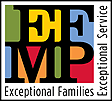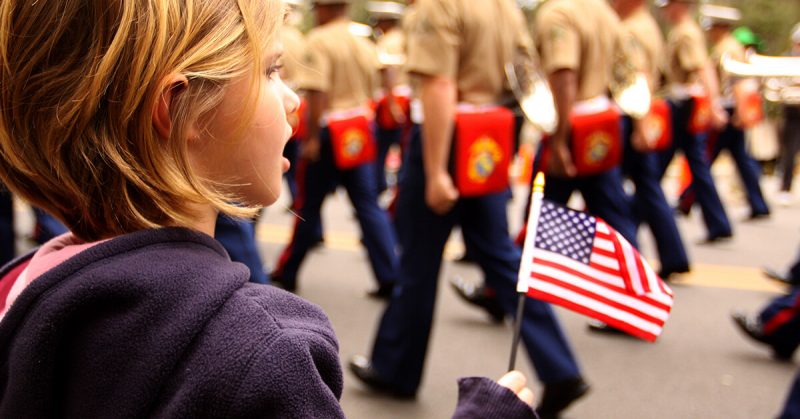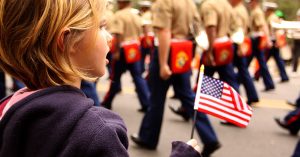Are You Prepared?
 The earthquake that struck Haiti earlier this month is a sobering reminder of the devastating power of natural disasters. While the quake in Haiti is unprecedented in the scope and scale of human suffering it has caused, I can’t help but think about the natural disasters that I endured with my husband and children during our more than 20 years as a military family.
The earthquake that struck Haiti earlier this month is a sobering reminder of the devastating power of natural disasters. While the quake in Haiti is unprecedented in the scope and scale of human suffering it has caused, I can’t help but think about the natural disasters that I endured with my husband and children during our more than 20 years as a military family.
The first was in Okinawa, Japan. It was 1989. Shortly after my husband and I arrived from Parris Island, I noticed several buildings with structural cracks. I was a young corporal working in Headquarters Battery, 12th Marines, and I was pregnant with our first child. It wasn’t until a few months after Kristen was born and an earthquake hit, that I understood what had caused those cracks. The shaking was so brutal that I was thrown to the floor and our 2nd lieutenant was hit on the head with a large ceiling vent. My first concern was my daughter. Thankfully she was fine.
A few years later, we were stationed at Camp Pendleton, Calif., when that area was rocked by an earthquake. By then I was an earthquake veteran, so I was prepared. Later during that assignment, severe flooding cut our housing area off from the main portion of the base. The airfield and the commanding general’s ranch house were both completely under water. It was more than a week before we had clean water to drink.
When we returned to coastal South Carolina in 1995, I volunteered as the battalion key volunteer. One of my major responsibilities was establishing a call tree for emergencies. The first time we activated it was to inform families that a hurricane was roaring toward the coast. We didn’t have many volunteers, so our callers had to contact 70 families each. Talk about stressful!
My family had prepared for an evacuation so I was surprised by the number of families who hadn’t. Some lacked transportation. Others didn’t have the cash (or credit) to afford a hotel or even fuel for their cars. We referred those families to the Navy-Marine Corps Relief Society for assistance. Very few of the families I spoke with had hurricane- preparedness kits.
At that time, our son who has autism was having significant issues and we had added family stressors. As communication lead for the base, my husband was required to stay with the base commanding general, so did not evacuate with us.
In 1999, when Hurricane Floyd was barreling towards Beaufort, S.C. we decided to leave town in advance of the mandatory evacuation order because we knew the traffic would be terrible. Our son had a very difficult time traveling and was self-injurious. Despite our early start, we still got stuck in traffic for five hours. Yet, it could have been worse. More than 800,000 residents evacuated from the coastline and millions others fled from coastal Georgia and Florida. Some military families with children with special needs were forced to spend the night sleeping on the side of the road.
We live further north now. My husband is deployed to Iraq — again — and the kids and I just had to dig ourselves out from a record amount of snow in December.
Those are just a few of our experiences with nature’s fury as a military family. The events on 9/11 and the threat of the pandemic influenza have also weighed heavily on us. As a result, we are a military family that is prepared. If you walk into the closet under the stairs in our house, you will find boxes of N-95 face masks, flashlights, a first aid kit, food (including chocolate!), a portable toilet, insect spray, and more.
As a military family with a child with autism we are also prepared for day-to-day emergencies. When our son was younger he was a ‘runner.’ He was fascinated by water and would use every opportunity to run towards it. A river located a few blocks away from our base housing unit was a major draw. We informed our neighbors of his tendency and worked with the military police and fire department to help keep him safe. Today, our son wears a medical alert bracelet and can provide his name, address, and telephone number if he gets lost. The article, Disaster Planning for Families of Children with Special Needs, has lots of good information to help you put together an emergency plan. It’s just one of many resources available from Military OneSource.
For more help and information on how to prepare for an emergency, call 1-800-342-9647 or go to www.MilitaryOneSource.com. A Military OneSource consultant will help you develop a personal emergency preparedness plan. Our installations have also been doing a superb job of informing families about emergency preparedness. If you have a family member with special needs, MilitaryHOMEFRONT (www.militaryhomefront.dod.mil) has valuable information and resources exclusively for military families with special needs.
Isabel Hodge is the special needs family support program manager for the Pentagon’s Office of Military Community and Family Policy as well as a Marine Corps veteran and 21-year military spouse. She is the mother of three, including an adult son with special needs.


